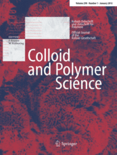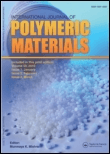
COLLOID AND POLYMER SCIENCE
Scope & Guideline
Advancing Knowledge in Materials Chemistry
Introduction
Aims and Scopes
- Colloidal Systems and Interfaces:
Research on the behavior, stability, and interactions of colloidal particles and their interfaces, including studies on surfactants, emulsions, and suspensions. - Polymer Synthesis and Characterization:
In-depth investigations into the synthesis, modification, and characterization of polymers, focusing on their physical and chemical properties. - Nanocomposites and Hybrid Materials:
Exploration of nanocomposite materials that combine polymers with inorganic nanoparticles, emphasizing their enhanced properties for applications in various fields such as medicine, electronics, and environmental science. - Rheology and Flow Behavior:
Studies on the flow properties and rheological behavior of polymeric and colloidal systems, with implications for processing and application in industrial settings. - Biomedical Applications:
Research focused on the development of polymeric materials for drug delivery, tissue engineering, and other medical applications, highlighting biocompatibility and functionality.
Trending and Emerging
- Sustainable and Green Materials:
There is a growing emphasis on the development of environmentally friendly polymers and colloidal systems, as researchers focus on sustainable practices in material synthesis and application. - Smart and Responsive Polymers:
Research on stimuli-responsive polymers that can change their properties in response to environmental factors (e.g., pH, temperature) is increasingly popular, particularly in drug delivery and sensor applications. - Nanotechnology in Colloidal Systems:
The integration of nanotechnology into colloidal science is a significant trend, with studies focusing on the use of nanoparticles to enhance the properties of polymeric materials and improve their functionalities. - Advanced Characterization Techniques:
Emerging methods such as in situ and real-time characterization techniques are gaining traction, allowing for better understanding of the dynamics and interactions within colloidal and polymer systems. - Biomacromolecules and Biodegradable Polymers:
Research into natural polymers and their derivatives, as well as biodegradable materials, is on the rise, reflecting the increasing interest in health and environmental sustainability.
Declining or Waning
- Traditional Polymer Blends:
Research on conventional polymer blends has decreased as more innovative and functional materials, such as nanocomposites and smart polymers, gain prominence. - Basic Surfactant Studies:
Studies focusing solely on the basic properties of surfactants, without application to complex systems, have waned as researchers seek more integrated approaches involving applications in emulsions and dispersions. - Static Characterization Techniques:
There is a noticeable drop in publications centered around static characterization techniques, as dynamic and advanced methods gain preference for providing more comprehensive insights into material behaviors.
Similar Journals

POLYMER SCIENCE SERIES C
Exploring Innovations in Materials ChemistryPOLYMER SCIENCE SERIES C is a distinguished journal published by MAIK NAUKA/INTERPERIODICA/SPRINGER, focusing on advancing research in the fields of polymer science and materials chemistry. With an ISSN of 1811-2382 and an E-ISSN of 1555-614X, this journal has been actively disseminating vital findings since its inception in 2000, aiming to converge knowledge and innovations until 2024. Operating out of the United States, it stands out with its current quartile rankings of Q3 across several categories, including Chemistry (miscellaneous), Materials Chemistry, and Polymers and Plastics, highlighting its evolving significance in the academic community. Despite its open access status, the journal attracts an engaged audience of researchers, professionals, and students, providing a platform for the publication of rigorous peer-reviewed articles that explore the intricacies of polymer synthesis, characterization, and applications. POLYMER SCIENCE SERIES C not only serves as a vital resource for keeping abreast of recent developments in polymer research but also stimulates interdisciplinary collaborations and innovative approaches in material science.

International Journal of Polymeric Materials and Polymeric Biomaterials
Unveiling the Future of Polymeric MaterialsThe International Journal of Polymeric Materials and Polymeric Biomaterials, published by Taylor & Francis AS, stands at the forefront of materials science, showcasing groundbreaking research in the fields of Analytical Chemistry, Chemical Engineering, and Polymeric Materials. With an ISSN of 0091-4037 and an E-ISSN of 1563-535X, this esteemed journal, established in 1971, serves as a vital platform for academics and professionals seeking to disseminate innovative findings and elevate the understanding of polymeric materials. Featuring a commendable impact factor and ranking in the top quartiles of its categories—Q2 in Analytical Chemistry, Chemical Engineering, and Polymers and Plastics—the journal is a pivotal resource for researchers aiming to leverage polymer science in various applications. Although it does not offer open access, its rigorous peer-review process ensures that only high-quality research is published, making it an essential reference for anyone involved in polymer research and development.

JOURNAL OF POLYMER MATERIALS
Innovating Materials, Inspiring DiscoveriesJOURNAL OF POLYMER MATERIALS, published by PRINTS PUBLICATIONS PVT LTD, is a pivotal platform within the field of materials science, focusing particularly on polymer and plastics research. Established in 1987, this journal has played a crucial role in disseminating innovative findings and advances in polymer materials, catering to a diverse readership of researchers, professionals, and students alike. Despite a break in Scopus coverage, it continues to contribute valuable insights into materials chemistry, reflected in its rankings within the lower quartile in related categories. With an ISSN of 0973-8622, the journal seeks to foster a greater understanding of polymer science and applications. Researchers are encouraged to submit their findings to a journal that aims to bridge the gap between theoretical research and practical application. While currently not offering open access, readers can benefit from the journal's commitment to scholarly excellence. Located in New Delhi, India, the JOURNAL OF POLYMER MATERIALS remains a significant resource for those passionate about polymeric materials and their extensive applications.

INTERNATIONAL JOURNAL OF POLYMER ANALYSIS AND CHARACTERIZATION
Unlocking the potential of polymer analysis.International Journal of Polymer Analysis and Characterization is a distinguished scholarly publication dedicated to the field of polymer science, with a focus on innovative methodologies and significant advances in the analysis and characterization of polymeric materials. Published by Taylor & Francis Ltd in the United Kingdom, this journal serves as a vital resource for researchers, professionals, and students deeply engaged in Analytical Chemistry, Chemical Engineering, and Polymer Science. With a convergence spanning from 1995 to 2024, it holds a Q3 ranking in the 2023 category quartiles for its valuable contributions to the fields of Analytical Chemistry, Chemical Engineering, and Polymers and Plastics. Despite being a non-open access publication, its rigorous peer-review process and comprehensive coverage of current trends ensure that the journal remains a crucial platform for disseminating impactful research. The journal is indexed in various databases, underscoring its relevance and quality in the academic community. Exploratory studies and articles that push the boundaries of polymer analysis find a welcoming home within these pages, making it an essential read for those aiming to stay at the forefront of polymer research.

Express Polymer Letters
Unleashing Innovation in Polymer ResearchExpress Polymer Letters is a leading open-access journal published by BUDAPEST UNIVERSITY OF TECHNOLOGY AND ECONOMICS, focusing on the fast-paced realm of polymer science and engineering. With a broad scope that encompasses the interdisciplinary fields of Chemical Engineering, Materials Chemistry, and Organic Chemistry, the journal serves as a crucial platform for researchers and professionals dedicated to advancing knowledge and innovation in polymer-related disciplines. Since its inception in 2007, it has consistently provided high-quality, peer-reviewed research and has achieved a respectable impact within various categories, evidenced by its Q2 quartile rankings across multiple Scopus categories and its competitive standings in the field. The journal's dedication to open access ensures that research is widely disseminated, promoting transparency and collaboration within the academic community. Positioned to converge into the future, Express Polymer Letters remains an essential resource for cutting-edge studies and developments, with an anticipated convergence period extending through 2024.

JOURNAL OF POLYMER SCIENCE
Catalyzing Knowledge Transfer in Polymer Science and ApplicationsJOURNAL OF POLYMER SCIENCE, published by WILEY, is a premier, open-access journal dedicated to advancing the field of polymer science and its applications. With an ISSN of 2642-4150, it offers a platform for high-quality research and innovative ideas, contributing significantly to the understanding of polymaterials and their functionalities. The journal is recognized for its exceptional impact within various categories, consistently achieving Q1 rankings in Materials Chemistry, Physical and Theoretical Chemistry, and Polymers and Plastics, demonstrating its influential presence in the academic community. As of 2023, it holds a distinguished position in Scopus rankings, underscoring its relevance and rigorous peer-review process. By facilitating open access to vital research findings, the JOURNAL OF POLYMER SCIENCE plays a crucial role in fostering collaboration and knowledge transfer among researchers, professionals, and students, paving the way for innovative developments in polymer applications and materials science.

JOURNAL OF POLYMER RESEARCH
Connecting Researchers with the Latest in Polymer AdvancementsJOURNAL OF POLYMER RESEARCH is a leading peer-reviewed journal published by SPRINGER, specializing in the dynamic fields of polymer science, materials chemistry, and organic chemistry. Operating since 1994, this esteemed journal has consistently delivered high-quality research articles that illuminate the latest advancements and innovations in polymer technology. With an increasing impact factor and placed in the Q2 category for both Materials Chemistry and Polymers and Plastics, it stands as a valuable resource for researchers, professionals, and students seeking cutting-edge knowledge in these areas. The journal is indexed in Scopus, highlighting its significance in the academic community, with notable rankings in Materials Science and Organic Chemistry. While it does not currently offer open access options, the meticulous selection of research and thorough peer-review process ensures each article's contribution to the field is both robust and impactful. Researchers aiming to expand their understanding and engage with pioneering studies will find JOURNAL OF POLYMER RESEARCH an indispensable platform.

POLYMER JOURNAL
Exploring the Dynamics of Polymers and PlasticsPOLYMER JOURNAL, published by SpringerNature in the United Kingdom, is a premier academic platform dedicated to the field of polymer science. Since its inception in 1971, this journal has become an essential resource for researchers and professionals interested in the latest advancements in materials chemistry, polymers, and plastics. With its robust H-index and a consistent ranking in the top quartiles of its categories—Q2 in both Materials Chemistry and Polymers and Plastics—POLYMER JOURNAL demonstrates a strong impact in the scientific community. It holds significant recognition in Scopus rankings, occupying the 68th percentile in Materials Chemistry and the 67th percentile in Polymers and Plastics. The journal's commitment to publishing high-quality research articles enables it to serve as a key reference point for innovative studies, theoretical developments, and practical applications in polymer science. Although it is not an open-access journal, researchers and students gain valuable insights through its extensive archives and rigorous peer-reviewed content, making POLYMER JOURNAL a vital source of knowledge for anyone engaged in this dynamic field.

MACROMOLECULAR CHEMISTRY AND PHYSICS
Exploring Innovations in Chemistry and PhysicsMACROMOLECULAR CHEMISTRY AND PHYSICS, published by WILEY-V C H VERLAG GMBH, is a prominent journal dedicated to advancing the fields of condensed matter physics, materials chemistry, organic chemistry, physical and theoretical chemistry, and polymers and plastics. With an impressive H-index and a Q2 ranking in various relevant categories for 2023, this journal serves as a crucial platform for researchers and professionals to publish their innovative findings and theoretical advancements from 1994 to 2024. The journal's commitment to high-quality research is reflected in its Scopus rankings, which highlight its significant impact within the scientific community. Although it does not currently offer open access, it remains an essential resource for those seeking to explore the intricacies of macromolecular science. With a growing global audience, MACROMOLECULAR CHEMISTRY AND PHYSICS continues to shape the future of materials and polymer research, making it a must-read for students, researchers, and industry professionals alike.

Polymers
Championing excellence in polymer research and discovery.Polymers is a premier journal published by MDPI, dedicated to advancing the field of polymer science and technology. This open-access journal, established in 2009, has quickly gained prominence in the academic community, serving as a vital platform for disseminating high-quality research articles, reviews, and communications in the realms of chemistry, polymers, and plastics. Based in Switzerland, with an impressive ranking in the Q1 quartile for both Chemistry and Polymer studies, Polymers boasts a significant impact factor, reflecting its rigorous peer-review process and esteemed editorial board. Researchers, professionals, and students alike benefit from the broad accessibility of content, allowing for a more extensive reach and engagement within the scientific community. As a key resource for the latest advancements and innovations in polymer research, Polymers continues to lead discussions, inspire collaborations, and foster the development of novel materials that shape various industrial applications.